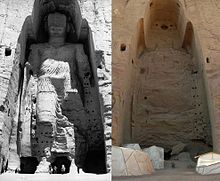
Back رقابة دينية Arabic Censura religiosa Spanish سانسور دینی Persian Penyensoran oleh agama ID Censura fetare Albanian Dinî sansür Turkish Релігійна цензура Ukrainian

| Freedom of religion |
|---|
| Religion portal |
Religious censorship is a form of censorship where freedom of expression is controlled or limited using religious authority or on the basis of the teachings of the religion. This form of censorship has a long history and is practiced in many societies and by many religions. Examples include the Edict of Compiègne, the Index Librorum Prohibitorum (list of prohibited books) and the condemnation of Salman Rushdie's novel The Satanic Verses by Iranian leader Ayatollah Ruhollah Khomeini.
Religious censorship can also take form in the destruction of monuments and texts that contradict or conflict with the religion practiced by the oppressors, such as attempts to censor the Harry Potter book series.[1] Destruction of historic places is another form of religious censorship. One cited incident of religious censorship was the destruction of the Buddhas of Bamiyan statues in Afghanistan by radical Islamists as part of their religious goal of oppressing another religion.[2]
- ^ Bald, Margaret; Wachsberger, Ken (2006). Literature Suppressed on Religious Grounds (Revised ed.). Facts on File. ISBN 0816062692.
- ^ "Toppling monuments, erasing history". The Washington Post. 18 August 2017. Archived from the original on 19 August 2017.